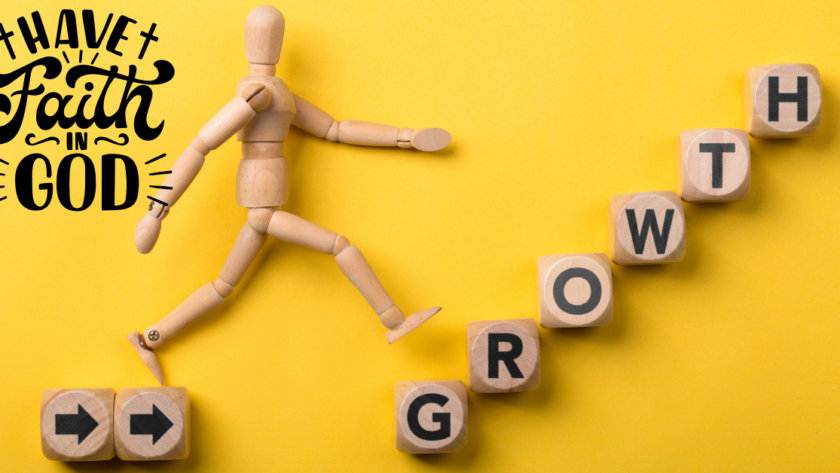When you’re trying to achieve self-improvement, I’ve uncovered that the intersection of spiritual beliefs and personal growth aspirations offers a unique opportunity for holistic development.
This convergence allows for a harmonious blend of faith and personal development, leading to a more fulfilling and purpose-driven life.
As someone who has extensively explored this path, I can attest to the transformative power of integrating these two essential aspects of our lives.
Understanding the Synergy
Faith and personal development are intrinsically linked. Our spiritual beliefs shape our values, worldview, and ultimately influence our personal growth journey.
As we develop as people, our understanding and experience of faith can deepen and evolve. Both faith and personal development are dynamic, ongoing processes.
They are paths to be walked, each informing and enriching the other along the way.
Aligning Values and Goals
The first step in harmonizing faith and personal growth involves aligning our values and goals. This process requires introspection and self-reflection to identify our core beliefs and how they relate to our personal aspirations.
By doing so, we ensure that our growth goals are in harmony with our spiritual values, creating a sense of congruence and purpose in our lives.
For example, if your faith emphasizes compassion and service to others, you might set personal development goals that involve improving your empathy skills or finding ways to contribute more meaningfully to your community. This alignment enhances your personal growth and deepens your faith practice.
Incorporating Spiritual Practices into Personal Development
Integrating spiritual practices into your personal development routine can effectively bridge the gap between faith and growth. Here are some approaches to consider:
Mindful Meditation
Incorporating elements of your faith into mindfulness practices can be incredibly powerful. This could involve meditating on sacred texts, contemplating spiritual concepts, or simply being present with your beliefs.
By combining mindfulness with your faith, you cultivate a deeper sense of awareness and connection to your spiritual self while also reaping the well-documented benefits of meditation for personal growth.
I’ve found that starting my day with a 15-minute meditation focused on a specific spiritual concept or passage has significantly improved my overall sense of well-being and clarity throughout the day. It’s a practice that grounds me in my faith while simultaneously enhancing my personal development.
Gratitude Journaling
Maintaining a gratitude journal that includes reflections on both personal achievements and spiritual blessings can foster a sense of appreciation for your growth journey and your faith.
By regularly acknowledging the positive aspects of your life, you’ll develop a more optimistic outlook and strengthen your resilience in the face of challenges.
In my own experience, dedicating time each evening to write down three things I’m grateful for – ranging from personal accomplishments to moments of spiritual insight – has dramatically shifted my perspective.
It’s helped me recognize the interconnectedness of my faith and personal growth, and how each supports the other.
Prayer and Affirmations
Combining prayer with positive affirmations that reflect both your personal goals and spiritual aspirations can reinforce the connection between your faith and your personal development efforts.
For example, you might create affirmations that express gratitude for your progress while also seeking divine guidance for your continued growth.
I’ve developed a practice of starting my prayers with affirmations like, “I am grateful for the strength and wisdom I’ve gained, and I seek guidance to continue growing in alignment with my faith.” This approach has helped me feel more connected to my spiritual beliefs while actively working towards my personal goals.
Spiritual Reading
Engaging with texts that inspire both spiritual growth and personal development can provide valuable insights applicable to both domains. Many religious and philosophical works offer wisdom that bridges the gap between faith and personal growth.
By exploring these texts with an open mind, you can gain new perspectives on your faith and uncover practical wisdom for your personal growth journey. I’ve found immense value in reading works from various spiritual traditions, as well as contemporary personal development literature.
This diverse reading list has broadened my understanding of both faith and personal growth, allowing me to draw connections I might have otherwise missed.
Embracing Challenges as Opportunities for Growth
Both faith and personal development often involve facing challenges and overcoming obstacles. By viewing these difficulties through the lens of your faith, you can find deeper meaning and purpose in your struggles.
This perspective can provide resilience and motivation to continue in your personal growth journey, even when faced with setbacks.
I’ve experienced this firsthand during particularly challenging periods of my life. By framing these difficulties within the context of my faith, I’ve been able to see them not just as obstacles to overcome, but as opportunities for spiritual and personal growth.
This shift in perspective has been instrumental in maintaining my motivation and resilience.
The challenges you encounter in your personal development can serve as opportunities to deepen your faith. They can prompt you to rely more heavily on your spiritual resources, seek guidance through prayer or meditation, and ultimately strengthen your connection to your beliefs.
Cultivating Spiritual Intelligence
As you combine faith with personal development, you’ll likely find yourself developing what some refer to as “spiritual intelligence.”
This involves the ability to apply spiritual principles to practical life situations, make ethical decisions aligned with your values, and maintain a sense of purpose and meaning in your daily activities.
Cultivating spiritual intelligence can enhance various aspects of personal growth, including emotional intelligence, decision-making skills, and interpersonal relationships.
It allows you to approach personal development with a more holistic perspective, considering not just your immediate goals and your long-term spiritual well-being.
In my own experiences, developing spiritual intelligence has been transformative. It’s allowed me to navigate complex personal and professional situations with greater clarity and purpose.
By consistently applying my spiritual principles to real-world challenges, I’ve found that my faith and personal growth have become increasingly intertwined and mutually reinforcing.
Building a Supportive Community
Integrating faith and personal development doesn’t have to be a solitary journey. Surrounding yourself with a supportive community can provide encouragement, accountability, and diverse perspectives.
This might involve joining a faith-based study group, participating in personal development workshops with like-minded people, or seeking out a spiritual mentor who can guide you in aligning your growth with your beliefs.
By engaging with others who share your commitment to both faith and personal growth, you can gain valuable insights, share experiences, and find support during challenging times. This sense of community can be a powerful catalyst for your integrated development journey.
I’ve found tremendous value in being part of a small group that meets weekly to discuss both spiritual topics and personal growth challenges.
The diverse perspectives and shared commitment to growth within this community have accelerated my progress in ways I couldn’t have achieved alone.
Creating Rituals and Habits
Developing rituals and habits that incorporate both faith and personal growth can help solidify the integration of these two aspects of your life.
This might involve starting your day with a combination of prayer and goal-setting, or ending each week with a reflection on your spiritual and personal progress.
Consider creating a personal mission statement that reflects both your faith values and your growth aspirations.
This can serve as a guiding light, helping you make decisions and set priorities that honor both your spiritual beliefs and your personal development goals.
For me, creating a morning ritual that combines meditation, prayer, and reviewing my personal goals has been instrumental in maintaining alignment between my faith and personal growth efforts. This daily practice sets the tone for my day and keeps me focused on what truly matters.
Embracing Continuous Learning and Adaptation
As you progress on this integrated path of faith and personal development, stay open to continuous learning and adaptation. Your understanding of both your faith and yourself will likely evolve over time.
Embrace this evolution as a natural part of your growth journey.
Be willing to question assumptions, explore new ideas, and adjust your approach as needed. This flexibility allows for a more authentic and sustainable integration of faith and personal development, one that can adapt to the changing circumstances and insights you encounter along the way.
In my experience, some of the most profound moments of growth have come from being open to new interpretations of my faith or challenging long-held beliefs about personal development.
This willingness to learn and adapt has kept my journey fresh and exciting, even after many years.
Applying Faith Principles to Personal Goals
One powerful way to harmonize faith and personal growth is by directly applying spiritual principles to your personal development goals. This approach allows you to see how your faith can practically enhance various aspects of your life.
For instance, if one of your personal goals is to improve your relationships, you might draw on faith teachings about love, forgiveness, and compassion.
By consciously applying these principles in your interactions, you’re working towards your personal goal and deepening your faith practice.
I’ve found this approach particularly effective in my professional life. By applying spiritual principles such as integrity, service, and humility to my work goals, I’ve been able to achieve success in a way that feels deeply aligned with my faith.
This alignment has brought a sense of purpose and fulfillment to my career that goes beyond mere professional accomplishments.
Balancing Self-Improvement and Self-Acceptance
One of the challenges in integrating faith and personal growth is finding the right balance between striving for improvement and practicing self-acceptance.
Many faith traditions emphasize the inherent worth and dignity of each individual, which can sometimes seem at odds with the personal development focus on constant improvement.
The key is to understand that self-improvement and self-acceptance are not mutually exclusive. Your faith can provide a foundation of self-worth and acceptance, while your personal growth efforts can be seen as a way of honoring and developing the gifts you’ve been given.
In my own experiences, I’ve learned to view personal growth not as a way to “fix” myself, but as a way to more fully express my authentic self and live out my faith. This perspective has allowed me to pursue growth with enthusiasm while maintaining a sense of self-acceptance grounded in my spiritual beliefs.
Leveraging Faith for Resilience in Personal Growth
Personal growth often involves stepping out of your comfort zone and facing challenges. Your faith can be a powerful source of resilience during these times, providing comfort, strength, and perspective when the going gets tough.
When faced with setbacks or difficulties in your personal development journey, drawing on your spiritual resources can help you maintain motivation and perseverance.
This might involve turning to prayer for strength, finding inspiration in sacred texts, or seeking support from your faith community.
I’ve experienced this firsthand during particularly challenging periods of personal growth. By anchoring myself in my faith during these times, I’ve been able to maintain a sense of purpose and hope, even when progress seemed slow or obstacles appeared insurmountable.
Cultivating Mindfulness Through Faith Practices
Mindfulness is a key component of many personal development approaches, and it’s also deeply rooted in many faith traditions. By exploring the mindfulness practices within your own faith, you can enhance your personal growth while deepening your spiritual connection.
This might involve practices such as contemplative prayer, meditation on sacred texts, or mindful rituals and ceremonies. These practices can help you develop greater self-awareness, emotional regulation, and present-moment focus – all valuable skills for personal growth.
In my experience, incorporating faith-based mindfulness practices into my daily routine has significantly enhanced both my spiritual life and my personal development efforts.
It’s helped me become more aware of my thoughts and behaviors, allowing me to make more conscious choices aligned with both my faith and my personal goals.
Aligning Personal Values with Faith Teachings
A crucial aspect of harmonizing faith and personal growth is ensuring that your personal values align with the teachings of your faith. This alignment creates a strong foundation for integrated development and helps prevent internal conflicts that can hinder growth.
Take time to reflect on your personal values and how they relate to your faith teachings. Where there are discrepancies, explore them deeply.
This process of alignment can lead to profound insights and personal transformation.
For me, this process of aligning my personal values with my faith has been ongoing and deeply rewarding. It’s led me to reassess some of my priorities and make significant life changes that have ultimately brought me greater fulfillment and a sense of living in integrity with my beliefs.
Embracing Forgiveness as a Growth Tool
Forgiveness is a central tenet of many faith traditions, and it’s also a powerful tool for personal growth. By practicing forgiveness – both of others and of yourself – you can release negative emotions, heal relationships, and create space for positive change.
Incorporating forgiveness practices into your personal growth journey can help you overcome obstacles, let go of past hurts, and move forward with greater freedom and peace.
This might involve regular self-reflection, specific forgiveness rituals, or seeking guidance from spiritual leaders on how to forgive in challenging situations.
I’ve found that making forgiveness a regular part of my personal growth practice has been transformative. It’s helped me let go of grudges, heal old wounds, and approach my relationships with greater compassion and understanding.
Cultivating Gratitude Through Faith and Personal Growth
Gratitude is another area where faith and personal development intersect beautifully. Many spiritual traditions emphasize the importance of gratitude, and it’s also recognized in personal development circles as a powerful tool for increasing happiness and well-being.
By cultivating a practice of gratitude that encompasses both your faith and your personal growth journey, you can enhance your overall sense of fulfillment and contentment.
This might involve keeping a gratitude journal, incorporating thankfulness into your prayers or meditations, or regularly expressing appreciation to others.
In my own life, developing a robust gratitude practice has been one of the most impactful ways I’ve integrated my faith and personal growth efforts. It’s helped me maintain a positive perspective, even during challenging times, and has deepened my appreciation for both the spiritual and personal aspects of my life.
Leveraging Faith Communities for Accountability
Accountability is a crucial factor in successful personal growth, and faith communities can provide an excellent structure for this.
Many religious groups already have built-in accountability systems, such as confession in Catholicism or accountability partners in some Protestant traditions.
By leveraging these existing structures or creating new ones within your faith community, you can enhance your personal growth efforts.
This might involve regular check-ins with a spiritual mentor, participating in small groups focused on personal development, or even starting a faith-based mastermind group.
I’ve found that having accountability partners within my faith community has been invaluable for my personal growth journey.
These relationships provide support, encouragement, and gentle challenges that keep me on track with both my spiritual and personal development goals.
Integrating Service and Personal Growth
Many faith traditions emphasize the importance of service to others, and this can be a powerful avenue for personal growth.
By engaging in service activities that align with your faith and personal values, you can develop important skills, gain new perspectives, and experience personal transformation.
Consider how you can combine service into your personal growth goals. For example, if you’re working on developing leadership skills, you might volunteer to lead a project at your place of worship.
If you’re focusing on compassion, you could get involved with a faith-based charity that serves vulnerable populations.
In my experience, some of my most significant personal growth has occurred through faith-based service activities. These experiences have challenged me, expanded my worldview, and helped me develop skills and qualities that have benefited all areas of my life.
Embracing Humility in Personal Growth
Humility is a virtue emphasized in many faith traditions, and it’s also an important quality for effective personal growth.
Embracing humility allows you to stay open to learning, accept feedback graciously, and recognize that there’s always room for improvement.
Incorporating humility into your personal growth journey might involve regularly seeking feedback from others, acknowledging your mistakes and learning from them, or practicing gratitude for the growth opportunities you encounter.
I’ve found that cultivating humility has been essential in my pathway of integrating faith and personal growth.
It’s helped me stay open to new insights, both spiritual and personal, and has allowed me to approach my development with a sense of curiosity and wonder as opposed to ego-driven ambition.
Celebrating Progress and Milestones
As you combine faith and personal growth, it’s important to celebrate your progress and milestones along the way.
This celebration can be a form of gratitude, acknowledging the role of both your own efforts and your faith in your development.
Consider creating rituals or ceremonies to mark significant milestones in your growth journey. These could be personal practices or shared celebrations with your faith community.
By acknowledging your progress, you reinforce the positive changes you’re making and motivate yourself to continue growing.
In my own experiences, I’ve found great value in regularly pausing to reflect on and celebrate my growth. These moments of acknowledgment have strengthened my commitment to both my faith and my personal development, and have helped me recognize the profound ways in which they support and enhance each other.
Key Takeaways
- Recognize the synergy between faith and personal development
- Align your values and goals to create congruence between spiritual beliefs and personal aspirations
- Incorporate spiritual practices into your personal development routine
- View challenges as opportunities for both spiritual and personal growth
- Cultivate spiritual intelligence to enhance overall personal development
- Build a supportive community that encourages both faith and personal growth
- Create rituals and habits that combine faith and personal development
- Remain open to continuous learning and adaptation in your integrated growth journey
People Also Asked
How can I combine my faith into my daily life?
Integrating faith into daily life involves consciously applying spiritual principles to everyday situations. This can include starting your day with prayer or meditation, making decisions based on your faith values, and finding opportunities to serve others in alignment with your beliefs.
Can personal growth conflict with religious beliefs?
While personal growth and religious beliefs can sometimes seem at odds, they often complement each other when approached thoughtfully.
The key is to ensure that your personal growth goals align with your faith values and to view growth as a way of honoring your spiritual beliefs.
What role does community play in faith-based personal development?
Community plays a crucial role in faith-based personal development by providing support, accountability, and diverse perspectives.
Engaging with others who share your commitment to both faith and growth can speed up your progress and provide encouragement during challenging times.
How can I develop spiritual intelligence?
Developing spiritual intelligence involves consciously applying spiritual principles to practical life situations.
This can be cultivated through regular spiritual practices, studying sacred texts and philosophical works, and seeking opportunities to apply your faith in everyday decision-making.
What are some effective ways to mix prayer and personal goal-setting?
Combining prayer and personal goal-setting can involve incorporating your goals into your prayer practice, seeking divine guidance in setting and pursuing your goals, and expressing gratitude for progress made.
You might also create affirmations that reflect both your spiritual beliefs and personal aspirations.
How can mindfulness practices enhance both faith and personal growth?
Mindfulness practices can enhance both faith and personal growth by increasing self-awareness, improving focus, and deepening your connection to the present moment.
Many faith traditions have their own forms of mindfulness practices that can be incorporated into a personal growth routine.
What role does forgiveness play in personal development?
Forgiveness plays a significant role in personal development by allowing you to release negative emotions, heal relationships, and create space for positive change.
It’s a powerful tool for overcoming obstacles and moving forward in both your spiritual and personal growth journey.
How can I maintain motivation in my personal growth progress through faith?
Maintaining motivation through faith involves regularly connecting your personal growth efforts to your spiritual beliefs, seeking inspiration from sacred texts or spiritual leaders, and viewing your growth as a way of honoring your faith. Regular prayer, meditation, and community engagement can also help sustain motivation.
What are some ways to measure progress in faith-based personal development?
Measuring progress in faith-based personal development can involve regular self-reflection, journaling about your experiences and insights, seeking feedback from trusted mentors or community members, and setting specific, measurable goals that align with both your faith and personal aspirations.
How can I balance self-improvement with self-acceptance in my faith journey?
Balancing self-improvement with self-acceptance involves recognizing your inherent worth as a spiritual being while also embracing growth as a way of honoring your potential.
This balance can be achieved by grounding your self-worth in your faith while viewing personal growth as a form of stewardship of your gifts and talents.




